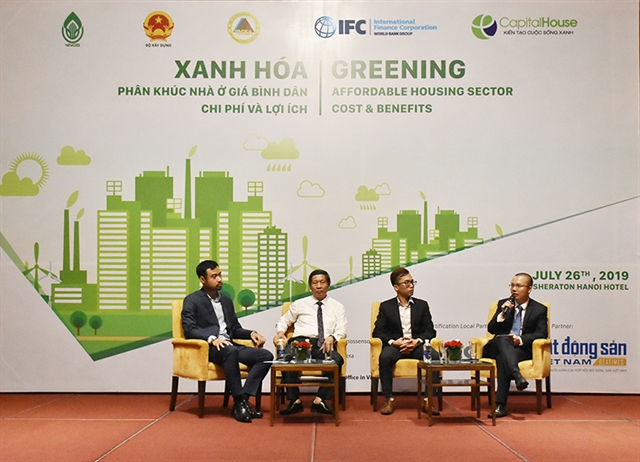Green buildings provide more benefits for investors in the long term than normal buildings and reduce the economic burden for low- and middle-income families.

Green buildings provide more benefits for investors in the long term than normal buildings and reduce the economic burden for low- and middle-income families, according to general secretary of Viet Nam Real Estate Association (VNREA) Nguyen Viet Chien.
Chien spoke at a workshop in Ha Noi on Friday about the costs and benefits of greening the affordable housing sector. He said investing in affordable housing projects would bring positive results for developers. The market segment could ensure social security for people, especially low income earners in big cities, and ensure the property market continues to develop in a sustainable manner.
“The affordable housing market has been talked about much in the past three years as real demand for the segment was always more than 80 per cent,” he said.
A VNREA survey showed that housing demand for the middle- and high-end segment with selling prices of more than VND25 million per square metre only accounted for 20 to 30 per cent and was mainly focused in big cities. Meanwhile, demand for affordable housing priced below VND25 million per square metre accounted for 70 to 80 per cent. However, there was not enough affordable housing to meet demand.
The association predicted that with the rapid urbanisation rate, 40 per cent of Viet Nam’s population of 100 million people would live in urban areas by next year. Big cities with populations of more than 1.7 million people would struggle to provide accommodations for everyone. To meet demand, the country needs to build about 700,000 apartments by the end of next year.
The association said high demand in the affordable housing sector would provide a good opportunity for real estate developers in the long term and they should consider adjusting their business strategies accordingly.
“This is good news for the market and for low-income earners," Chien said. "However, investor shortcomings and tightening credit policies in the market have been barriers to the segment’s development."
Affordable housing projects have not given attention to applying green designs or smart and energy-saving technologies even though this segment has the most customers and consumes the most energy. For these reasons, applying green solutions in affordable housing could protect the environment.
To encourage the development of environmentally friendly buildings, the Government should have policies and plans as well as a clear definition of what constitutes a green building. These would provide guidance for investors as they develop their projects.
Vu Hong Phong, a specialist on green buildings at the International Financial Corporation, said Viet Nam could make green construction much cheaper. In developing countries with rapid construction, the use of EDGF – a green building certification system focused on making new residential and commercial buildings more resource-efficient – can help overcome market shortcomings while only driving construction costs up by one or two per cent.
Trinh Tung Bach, director of the Research and Development Department at Capital House Group which received the EDFG certification for its EcoHome 3 affordable housing project, said those who live in green buildings enjoy a more convenient life, improved health and decreased power and water costs.
“Our apartments were sold more quickly thanks to applying green criteria in our design," Bach told Viet Nam News. "The rapid sale offset for the higher cost of greening our apartments and reducing marketing costs."
Bach said customers at their projects saved 25 per cent on electricity and 36 per cent on water bills.
“In addition, the long-term value for developers of greening their projects is that their brand will carry more value thanks to good products," he said. "International organisations and foreign partners will want to co-operate with our company."
Green buildings are more attractive to home buyers, according to Cuong. He suggested the Government have preferential credit and land fund policies for investors who build environmentally friendly housing. — VNS





